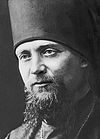

| Previous day | Next day |
| Old Style
October 15
|
Saturday |
New Style
October 28
|
| 21st Week after Pentecost. Demetrius’ Saturday. Commemoration of the Dead. Tone 3. | No fast.
|
![]() St. Euthymius the New, of Thessalonica, confessor (889).
St. Euthymius the New, of Thessalonica, confessor (889). ![]() Hieromartyr Lucian, priest, of Antioch (312).
Hieromartyr Lucian, priest, of Antioch (312). ![]() New Hiero-confessor Athanasius (Sakharov), bishop of Kovrov (1962).
New Hiero-confessor Athanasius (Sakharov), bishop of Kovrov (1962).
Martyrs Sarbelus (Thathuil) and his sister Bebaia, of Edessa (98-138). St. Sabinus, bishop of Catania (760). Hieromartyr Lucian, hieromonk of the Kiev Caves (1243). St. John, bishop of Suzdal (1373). St. Dionysius, archbishop of Suzdal (1385).
New Hieromartyr Valerian Novitsky, priest, of Telyadovich (1930). Synaxis of New Hieromartyrs of Belorussia: Archimandrite Seraphim, Priests Vladimir (6), Basil, Sergius, Michael (2), Porphyrius, Dimitry (2), John (3), Leonid, Alexander, Matthew, Peter, Valerian, Nicholas, and Deacon Nicholas.
Icon of the Most Holy Theotokos “She Who Ripens the Grain.” (19th c.)
St. Barses the Confessor, bishop of Edessa (378). St. Aurelia of Strasbourg (Alsace, Gaul) (ca. 383). St. Thecla, abbess, of Ochsenfurt (Germany) (ca. 790).
Repose of Priest Nicola Yanney of Nebraska (1918).
Thoughts for Each Day of the Year
According to the Daily Church Readings from the Word of God
By St. Theophan the Recluse

Saturday. [II Cor. 3:12-18; Luke 6:1-10]
The Lord’s disciples pluck the ears of grain, rub them in their hands and eat them on the Sabbath—a deed very unimportant both in appearance and in essence; meanwhile the Pharisees could not restrain themselves and rebuked them. What made them raise this issue? In appearance—unreasoning zeal, but in essence—the spirit of judgmentalness. This sticks to everything and presents all in a sombre form of unlawfulness and destructiveness. This infirmity, to a greater or lesser degree, is common to almost all people who do not watch themselves. Not everyone will express judgmental thoughts in word, but it is rare for a person to refrain from them. Someone sits beside the heart and stirs up judgmentalness—it pours forth. But at the same time the judge himself is prepared to do deeds which are not good, as long as nobody sees, and he is unfailingly in a state that is not so good in some way. It is as though he judges and condemns for that very reason—in order to satisfy his inwardly insulted and suppressed feeling of righteousness with attacks on others, groundless as they may be. He who loves righteousness and stands in it, knowing how difficult it is to attain correctness in deeds and even more so in feelings, will never judge; he is ready sooner to cover with leniency not only small, but also great transgressions of others. The Lord does not judge the judging Pharisees, but indulgently explains to them that the disciples did something that anyone would excuse if they thought about it rightly. And it almost always is this way: think reasonably about your neighbor’s actions and you will find that it does not at all have that serious, ghastly character which you saw at first.
Articles
 Martyr Lucian the Presbyter of AntiochThe Hieromartyr Lucian, Presbyter of Antioch, was born in the Syrian city of Samosata. At twelve years of age he was left orphaned. |
 Hieromartyr Lucian the Presbyter of the Kiev CavesSaint Lucian is also commemorated on August 28 with the holy Fathers of Kiev’s Far Caves of Saint Theodosius. |
 St. John the Bishop of SuzdalSaint John, Bishop of Suzdal, entered one of the monasteries of Suzdal while a youth. |
 St Dionysius the Archbishop of Suzdal |
 St. Demetrios Saturday |
 Memorial Saturday of St DemetriosThe St Demetrios Memorial Saturday was established for the churchwide remembrance of the soldiers who fell in the Battle of Kulikovo. |







